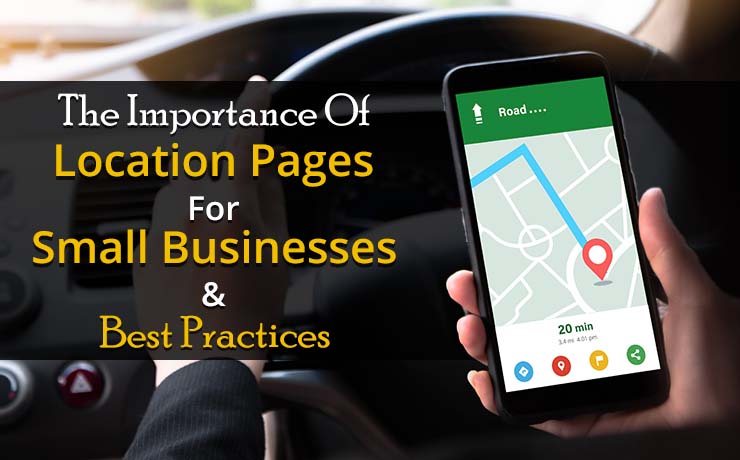Building and maintaining a strong online presence is essential for small businesses. As consumers increasingly search for products and services online, it’s critical that businesses make it easy for potential customers to find them. For businesses with physical locations or those that serve specific geographic areas, having dedicated location pages on their website is an invaluable tool for boosting local search engine optimization (SEO) and enhancing user experience.
In this post, we explain the importance of location pages, why they matter for small businesses, and best practices for optimizing them to attract more customers and improve local SEO performance.
What are Location Pages?
Location pages are dedicated sections or web pages on a business’s website that provide specific information about the business’ physical locations or the areas they serve. These pages typically include details such as:
- Business address
- Phone number
- Operating hours
- Services provided at that location
- A map with directions
- Reviews and testimonials from local customers
- Photos and descriptions of the location
For businesses with multiple locations, each location should have its own separate page with unique content tailored to that specific geographic area.
Why Location Pages Matter for Small Businesses
1. Improving Local SEO
For small businesses, especially those with physical storefronts, local SEO is important.
Search engines like Google place a high emphasis on delivering local search results that match the user’s intent. For example, when someone searches for “plumber near me” or “coffee shop in [city],” Google aims to show relevant businesses in that location.
Location pages can significantly improve a business’s chances of appearing in local search results. Business owners need to provide clear, structured information that search engines can easily index and display.
Google My Business (GMB) listings, while important, aren’t the only factor contributing to local SEO success—having dedicated and optimized location pages ensures that your website will rank in organic local searches.
2. Increased Visibility on Search Engines
For small businesses, especially those competing against large corporations or franchises, visibility in search results can make or break success. Location pages offer an excellent opportunity to rank for geographically relevant searches by leveraging local keywords and tailoring the content to match local search intent.
For instance, a bakery in Chicago with a well-optimized location page will be more likely to appear when someone searches for “best bakery in Chicago” than a business that doesn’t have a specific location page targeting that city.
3. Enhanced User Experience
In addition to SEO benefits, location pages improve the overall user experience on your website. When potential customers visit your website, they expect to find all relevant information quickly. Location pages provide easy access to the essential details, such as directions, business hours, and contact information, helping customers make informed decisions.
If customers are looking for your services in a specific area, having this dedicated content minimizes the friction they experience while searching for the necessary information. Providing local reviews, directions, and nearby landmarks further personalizes the experience, helping customers feel confident about choosing your business.
4. Building Local Trust and Authority
Location pages also act as an opportunity to build local credibility. By including customer testimonials, reviews, and showcasing your business’s involvement in the local community, these pages can create trust with potential customers. People are more likely to do business with companies they feel have a strong connection to their community.
In addition, search engines prioritize businesses that have a clear local presence and offer a positive user experience. By properly structuring and optimizing location pages, small businesses can demonstrate their authority within their geographic area, further enhancing their position in search engine rankings.
How to Create Effective Location Pages for Small Businesses
While location pages offer tremendous benefits, creating effective, SEO-friendly pages requires careful planning and execution. Here are some best practices to consider when developing or improving your location pages:
1. Unique Content for Each Location
Each location page should have unique content specific to the area it serves. Simply duplicating the same content across multiple location pages can harm your SEO efforts, as search engines may penalize websites for having duplicate content.
For example, if you have three different store locations, each page should highlight unique aspects of that location. Discuss how the location serves the local community, showcase staff members who work there, and provide details about services or promotions exclusive to that area.
2. Incorporate Local Keywords
Using local keywords is essential for local SEO. Conduct keyword research to identify search terms that customers in your area are likely using. Incorporate these local keywords naturally into your location page content, such as:
- Meta title and description
- Headings (H1, H2, H3)
- Body text
- Image alt tags
For instance, a plumbing company in Atlanta may want to target keywords like “best plumbing services in Atlanta” or “emergency plumber in Atlanta.” Sprinkle these terms throughout the page, but avoid keyword stuffing, as it can negatively impact your rankings.
3. Use Structured Data Markup
Search engines use structured data markup (also known as schema markup) to understand the content on your website more easily. By using local business schema on your location pages, you can help search engines better interpret the information and present it more effectively in local search results.
For example, structured data can provide Google with details like your business address, phone number, and hours of operation, which can then appear in rich snippets or as part of a knowledge graph panel.
4. Include NAP (Name, Address, Phone Number) Information
One of the most critical elements of a location page is accurate and consistent NAP information. Ensure that the business name, address, and phone number are clearly visible on each location page and are consistent across all digital platforms, including Google My Business, social media profiles, and other online directories.
Inconsistent NAP information can confuse both search engines and potential customers, reducing the likelihood of ranking in local searches and negatively impacting user experience.
5. Embed Google Maps and Driving Directions
Adding a Google Map embed on each location page is an excellent way to enhance the user experience and local SEO. Embedding a map helps visitors find your business easily and provides additional trust signals to search engines.
Alongside the map, consider offering detailed driving directions from major landmarks or highways. This not only aids local customers but also signals to search engines that your business is genuinely rooted in the local area.
6. Encourage and Display Local Reviews
Customer reviews and testimonials are powerful social proof. Search engines consider reviews as a factor when ranking businesses in local searches. By encouraging customers to leave reviews on Google, Yelp, or other platforms, you increase your chances of ranking higher in search results.
On each location page, display relevant customer reviews from that specific location. For example, if a customer left a positive review about their experience at your New York store, feature that review on the New York location page. This builds trust and shows potential customers that your business has a positive reputation in their area.
7. Optimize for Mobile Users
Most local searches are conducted on mobile devices, so your location pages must be mobile-friendly. Make sure your pages load quickly, are easy to navigate, and display all the necessary information in a format that’s accessible on small screens.
Use responsive design to ensure your location pages are optimized for all device types. Google rewards mobile-friendly websites with better rankings, so optimizing for mobile is crucial for improving your local SEO efforts.
8. Link to Other Local Resources
Another effective strategy for building location-specific authority is linking to other relevant local resources. This could include partnerships with local businesses, sponsorships for community events, or links to local news stories that mention your business.
By demonstrating your involvement in the local community, you not only provide value to your customers but also establish more local relevance in the eyes of search engines.
Location pages are a critical component of any small business’s local SEO strategy. By creating dedicated pages for each physical location or service area, businesses can improve their visibility in local search results, offer a better user experience, and build trust with potential customers.
When crafting location pages, it’s important to focus on providing unique, location-specific content, using local keywords, and implementing SEO best practices such as structured data markup and consistent NAP information. By doing so, small businesses can increase their chances of ranking higher in local search results and ultimately drive more traffic and conversions.
For small businesses looking to stand out in their local market, investing in well-optimized location pages is an essential step toward online success.
 Free
Consultation
Free
Consultation Free
Google Ads Audit
Free
Google Ads Audit









